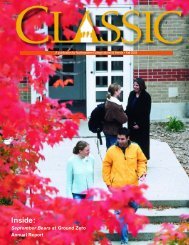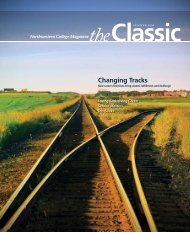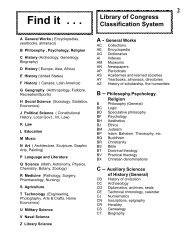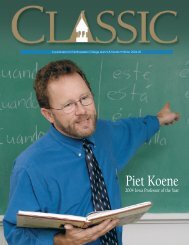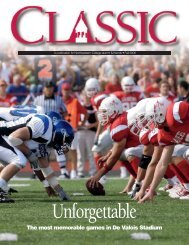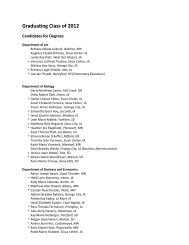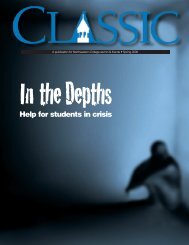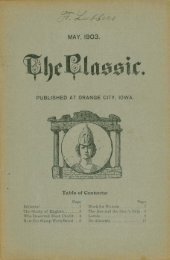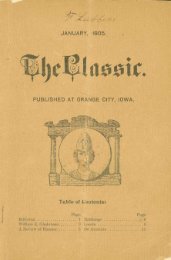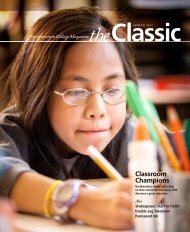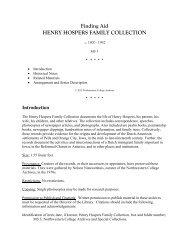Summer 2010 - Northwestern College
Summer 2010 - Northwestern College
Summer 2010 - Northwestern College
- No tags were found...
Create successful ePaper yourself
Turn your PDF publications into a flip-book with our unique Google optimized e-Paper software.
Classic ThoughtsWhat’s Your Legacy?Our Past, Haiti’s Futureb y Ca r l Li n d s k o o g ’02In 2002, just days after I arrived in Washington,D.C., for a semester-long internship program, Imet Augustine, a beautiful and captivating fellowintern from Florida. Augustine is Haitian, and as Igot to know this fascinating woman, I also becamefascinated by the rich history and culture of Haiti.Now I’m completing a dissertation on the history ofHaitians in the United States, and Augustine is mywife. Through her, I’ve fallen in love withthe people of Haiti.As thrilling as it has been to exploreHaitian culture and history, it has alsobeen uncomfortable and painful. I havebeen especially interested in the historicalrelationship between the United Statesand Haiti and in the experience ofHaitian immigrants in the U.S. It wasnot easy, therefore, to learn about themany instances in which my country hasadopted policies that have led to extremehardship for the Haitian people.Even in just the past 100 years,much is disturbing about the UnitedStates’ relationship with Haiti. Duringthe American occupation from 1915 to 1934, theU.S. imposed the corvee, a labor system of forcedservitude that reminded the Haitian people of theirpast enslavement. When peasants resisted the corvee,U.S. Marines violently suppressed the insurgents andexecuted their leaders.Post-occupation turmoil contributed to the riseof the now notorious dictator Francois “Papa Doc”Duvalier. Papa Doc has become synonymous in theminds of many Americans with the worst excesses ofgovernment brutality and state terror. What is lesswell-known is the degree to which he enjoyed U.S.support. American leaders tolerated Duvalier becausethey regarded him as reliably anti-Communist.After Papa Doc’s death, the U.S. supportedhis son, Jean-Claude “Baby Doc,” working withhim to institute an economic model that enrichedinternational agribusiness and manufacturers whiledestroying peasant agriculture and entrenchingHaitian cities in poverty. When the Haitianpeople finally broke the chains of dictatorship anddemocratically elected a populist priest, Jean-BertrandAristide, the U.S. backed his overthrow twice.American policies have contributed to hardship forHaitians in the U.S. as well. Undocumented Haitiansin South Florida—after escaping Haiti’s political andeconomic oppression—have been imprisoned anddeported by officials who claim they are economicimmigrants rather than political refugees. Cubans,meanwhile—another group of undocumentedrefugees to Miami—have been allowed to stay.Why review all this unpleasant history? Shouldn’twe look ahead to a reconstructed post-earthquakeHaiti rather than glancing backward?I believe we must acknowledge our responsibilityin past injustices before we can resurrect a new, moreequitable relationship between the U.S. and Haiti.Moreover, understanding the way American policieshave often harmed Haitians might help us avoidsimilar abuses in the future.For example, more than $9 billion has beenpledged for the next three years and beyond to rebuildHaiti. However, the accompanying economic plancontinues and even increases Haiti’s dependence onforeign investment and proposes rejuvenating Haiti’slow-wage, labor-intensive assembly industry.This is the same failed economic model imposedon Haiti in the 1970s and ’80s. No wonder, then, thatmembers of Haitian grassroots organizations—whohave been shut out of these meetings about Haiti’sfuture—have claimed the plan “fails to addresssustainable development needs.”Because of the tragic Haitian earthquake, manyAmericans are taking a new interest in Haiti. For thesake of my wife Augustine’s family members whoremain in Haiti—and for all Haitians—I hope thisrenewed interest includes an honest appraisal of ourrole in Haiti’s past and a genuine effort to help Haitiachieve a sustainable recovery.Carl Lindskoog attended <strong>Northwestern</strong> from 1998 to2000. He has a B.A. from the University of Iowa, anM.A. from Northern Illinois University, and is a Ph.D.candidate at City University of New York. Carl is theson of Dr. Don Lindskoog and Dr. Verna De Jong,<strong>Northwestern</strong> professors emeritus of psychology andEnglish, respectively.ABe intentional.s a little girl, Miriam (Korver ’74) Hectorwatched Dr. Rodney Jiskoot play organ atAlton Reformed Church. “My family didn’t have apiano yet,” she says, “but I’d go home and pretendto play like him, with my fingers on two levels of awindowsill.”When Hector came to <strong>Northwestern</strong>, she wasthrilled to study with the musician who firstinspired her to play. “He said, when accompanying hymns, to read the words andconvey their meaning through my playing,” she says. “People tell me myaccompaniment is worshipful. He taught me that. He gave me so much.” That’swhy Hector wanted to give back, helping to establish the Dr. Rodney JiskootOrgan Scholarship in memory of her mentor.To contribute to the Dr. Rodney Jiskoot Organ Scholarship—or to give to one of 33other scholarships that honor the legacies of <strong>Northwestern</strong> professors and staffmembers—contact Cornie Wassink, 712-707-7109 or corniew@nwciowa.edu.40SUMMER <strong>2010</strong>



